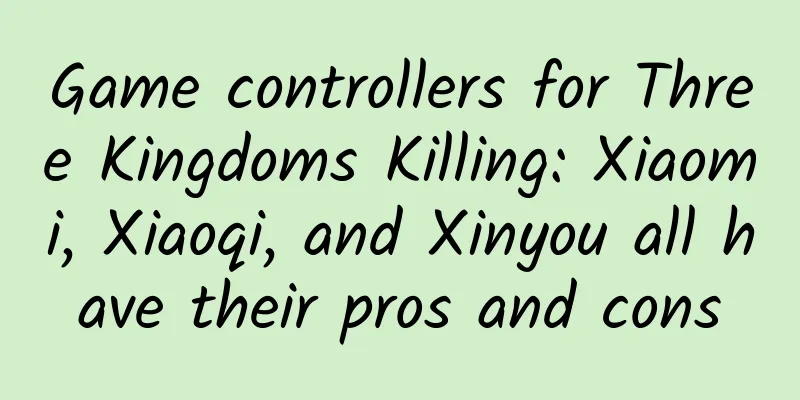Game controllers for Three Kingdoms Killing: Xiaomi, Xiaoqi, and Xinyou all have their pros and cons

|
Game controllers have never been as popular as they are now. On January 29, the new game wireless game controller officially started limited pre-sale in the Future Store. As of press time on the 2nd, sales have reached nearly 15,000 units. Correspondingly, Xiaomi officially released the Xiaomi Bluetooth controller on January 20, which had been tested for half a year, while UC Jiuyou officially opened reservations for 2,000 Xiaoqi controllers on January 14. Three companies, the "hardware giant" Xiaomi, one of the important game channels UC, and the startup company Xinyou Internet, started a war over controllers at the beginning of 2015. What's behind this war is that game controllers seem to be playing an increasingly indispensable role in the entire gaming industry. What is the point of moving from behind the scenes to the front stage? The development history of game controllers spans 40 years. From Atari to Nintendo, and then to Microsoft and PS, the evolution of generation after generation of home consoles is actually also the evolution of game controllers. From the early crude joystick type to the modern ones with vibration, it can be said that controllers are becoming more and more exquisite. However, even when Microsoft claimed that the R&D cost of the Xbox controller was as high as $100 million, the game controller still did not receive such great attention. So why did game controllers suddenly gain so much attention at the beginning of 2015? We can explain it in three reasons. 1. The handle changes from a supporting role to a protagonist. The previous controllers, no matter what, are still game controllers. They are part of the home console. When you take the controller out separately, you will find that it is immediately useless and can only be used to crack walnuts. It must rely on coexistence with the host. But with the development of smart hardware technology, the handle can gradually become a device with the final say and can act independently. Although it still needs to be used with various smartphones, PADs, and TVs, the dominant power lies with the handle, not these phones. Taking the new wireless controller of Xinyou as an example, this controller now has more than 2,000 games installed, and is compatible with different devices and universal across platforms. In a sense, the controller has begun to become dominant. It is no longer an accessory but a platform, a gaming platform. 2. The development of mobile games and the urgent explosion of TV games There is no doubt that the mobile game industry will see an explosion of heavy games in 2015. The explosive growth of mobile games in 2013 and 2014 was due to the huge demographic dividend, but now that the demographic dividend has disappeared, it is no longer possible to grow by simply attracting users through light card games. We must develop into deeper and more heavy games. However, heavy games have natural operational problems on mobile phones, and the existence of handles will solve this problem. 2015 will also be an extraordinary year for TV games. If 2014 is defined as the first year of TV games, 2015 will be the year when TV games will start to take off. However, there are too many systems among TV games now, and each of them is independent of the other. Let’s put aside Microsoft and Sony, which have suffered a setback in China, and only talk about the box system with greater market potential. There are dozens of game boxes on the market, if not hundreds, and there are countless platforms. There is a lack of an effective standard. Players are separated from each other. Xiaomi Box and LeTV Box cannot coexist naturally, but the controller is a must-have for playing games. Therefore, the controller will connect these fragmented worlds. 3. Clear business model Compared to wearable devices that are still telling business stories, the business story of handles is the most ready-made and easiest to implement. So far, we have seen that whether in the PC era or the mobile phone era, games are the first profitable item. In the era of intelligent everything, believe me, games will still be the first profitable item, which is why Oculus focuses on games. The business model of the handle can be explained in two parts. First of all, on the B-side, since the controller can help game companies solve the problem of developing into heavy games and deep users, game companies have never been reluctant to open their wallets for such things. This is much less than the cost of spreading it to the market and R&D companies. And you have to know that the cost for mobile game companies to compete for a new user who is not sure whether he will stay and pay is as high as tens of yuan, while a controller that costs less than 100 yuan faces heavy game users with higher ARPU values. The effect brought by this is not comparable to the new users who are spread out in a wide net. The second is the C-end. Since the handle is a system and a platform in itself, it has the ability to obtain user information and profit from C-end users. In other words, it can completely get promotion fees from the B-end and then get game consumption share from the C-end, just like the current major distribution channels. All of this is based on the fact that hardware itself does not make money. What are the pros and cons of the fight among the three companies? Therefore, the game controller market is a huge space, which is why Xiaomi, Xinyou and UC are competing against each other in just one month. So what are the pros and cons of each of these three companies? Millet Xiaomi's advantage is that it has a large number of users and fans, and Xiaomi is already the most well-known hardware brand in China, so its controllers will inevitably have huge sales. At the same time, as one of the important channels for domestic game distribution, Xiaomi can negotiate better with game manufacturers. The last point is that Xiaomi has a huge supply chain advantage in hardware. But the disadvantages are also obvious. First, it is not focused. Xiaomi's business line is too long, and it may not be able to take care of a small game controller. For Xiaomi, the existence of the game controller is to better serve its users, its mobile phone, tablet, and TV users. As a result, the Xiaomi controller has become a supporting role in the past, so it is difficult for the Xiaomi controller to develop. After all, it is just a marginal business. Secondly, the price-performance ratio that Xiaomi relies on may not be so effective on the controller. The price of the controller is not high. It is impossible for Xiaomi to play the price card like foreign ones, which are often thousands of yuan. The price of UC and new game controllers has reached hundreds of yuan. Therefore, it is impossible for Xiaomi to play the price card, and Xiaomi's technology on the controller has not been well conquered. From the first launch of the Xiaomi mobile phone, Xiaomi TV, Xiaomi box, and Xiaomi box enhanced version, which only supports Xiaomi devices, to the current removal of mobile phones and only three items, Xiaomi must have a problem with technology. UC9you One of the biggest advantages of UC is that it is one of the few game distribution channels in China, which is the same as Xiaomi. What Xiaomi does not have is that UC has the support of Alibaba, whether it is Alibaba Cloud, the home entertainment platform that Alibaba is trying hard to build, or Alibaba's e-commerce, Xiaoqi will surely get certain resources. The disadvantage of the Xiaoqi handle is that UC has no experience in hardware. You have to know that hardware is not just about making it, it also needs after-sales service and marketing. Moreover, although the channel identity is an advantage, it is also a major disadvantage, because other major channels cannot help UC. There is a competitive relationship between the two parties, which will make the CP in the middle face a problem of choice. ***, the handle will definitely be a loss-making business in the early stage. Although UC can afford the loss, if it does not see the effect for a long time, will UC persist? New Tour The advantage of Xinyou is that it is focused enough. Zhou Hongyi once wrote an article titled "Why a department of a large company cannot beat a small company?" In it, he mentioned: The biggest advantage of a small company is that although the team is small, if it only does one thing, one product, one function, and mobilizes all manpower, it can achieve the best. Secondly, its other major advantage is its third-party identity, which will facilitate its negotiations with major channels. Moreover, it has the advantage of being the first mover. When Xiaomi and Xiaoqi were just trying out their skills, Xinyou had already started selling on a large scale, which would buy it precious time. Finally, the team composition of Xinyou may also be a point that cannot be ignored. According to information from public channels, first of all, one of its founders was in charge of wireless projects at 91 Wireless and 360, and the hardware team is mostly from companies such as MediaTek, Lingyang and Foxconn. In terms of channels, it is formed by teams from Philips and Xiaoxiong Online. The team is the startup company Xinyou. The core of competing with giants. However, Xinyou has too many disadvantages. First of all, it is a startup company, not as famous as UC Xiaoqi, let alone Xiaomi. Secondly, it has no resources. Compared with UC Jiuyou and Xiaomi, Xinyou needs to start step by step. At least now it has no resource support. In addition, don’t forget whether Xinyou’s financial ability can keep up with the initial money-burning war. Finally, it will also face problems such as supply chain, after-sales service and continuous innovation ability. You must know that Xinyou is a complete process from 0 to 1. To sum up, it can be said that the three companies have their own advantages and disadvantages. Startups have their own difficulties, and large companies have their own problems. Resources are an advantage but also a disadvantage. It is unclear at the moment which of the three companies will be able to break through, but what is certain is that the handle market has been opened up. |
<<: Xinyou Internet CEO: Creating an ideal connector for multi-screen entertainment
>>: iOS 8's excellent cross-app communication effect: Interpretation of Action extension
Recommend
You saved the calf with good intentions, but ended up causing the calf to be euthanized?
In Yellowstone National Park in the United States...
If you choose the wrong tap, you will drink poisonous water every day. How to choose? Remember these points
Reviewer of this article: Li Xueyang, Postdoctora...
Recently, it has been a high incidence! Someone was suddenly "slashed" while riding a bicycle? The "culprit" turned out to be a common spring activity...
In March, the spring breeze is like smoke, the te...
Where can I find materials for information flow delivery? I will share all my private channels with you!
As the saying goes, if you want to do your work w...
Create short video IP in the first year of 5G and make your fans addicted to you
2019 is known as the first year of 5G. The arriva...
In order to store your chat history, the data center consumes the electricity of two and a half Three Gorges Hydropower Stations in a year!
Audit expert: Ji Hongzeng PhD candidate in Power ...
Hunting, war, maintaining rule...what secrets are hidden behind the poison?
Influenced by "Water Margin", everyone ...
How to cook a chicken with bare hands? Beat the chicken for 13 hours and 37 minutes
As a good friend of mankind, chickens are of grea...
You can make money by donating your shit, and earn a high-end mobile phone every month. How much money can your poop get you?
Some time ago, a piece of news like this became a...
Introduction to Yin Tao: How should you write the robots file to get a high ranking in Baidu?
How should I write the robots file to rank higher...
APP operation: 8 rules to help you quickly find promotion shortcuts
The eight golden rules introduced in this article...
The monthly download volume of Bullet SMS is less than 6,000. Will Alipay be its life-saving straw?
Bullet Messenger was forced to take a roller coas...
Feng Qingyang's "Stock Market Practice" Stock Trading Training Lecture No. 2
Training course content: Maybe you spent a lot of...
Breaking news! The 6.2-magnitude earthquake in Gansu has killed 111 people! How to avoid danger and save yourself scientifically when encountering an earthquake?
At 23:59 Beijing time on December 18, a magnitude...
Aiti Tribe Stories (21): How difficult is it to take over a project midway? Teach you how to be a good takeover man!
[51CTO.com original article] Ha Han Langzi, who h...









